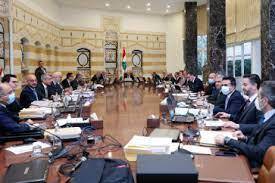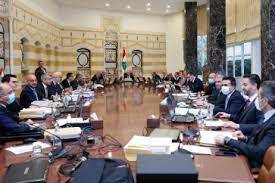The newspaper "Al-Liwaa" reports that amidst the ongoing electoral debates, discussions regarding the citizens' "food security," which threatens the upcoming parliamentary elections as noted by Culture Minister Mohammad Mortada, resemble a "life crisis" for the poor who can barely secure their daily sustenance. In response to the social media buzz concerning a list supported by Sheikh Bahaa Hariri, a responsible source from the "Sawa for Lebanon" movement confirmed that there is no list in Beirut backed by him or "Sawa", emphasizing support only for change candidates, dismissing all other claims as baseless.
Regarding negotiations between the government team and the International Monetary Fund (IMF), informed sources indicated significant progress towards an agreement. However, two major issues hinder the negotiations' conclusion: first, the final approval and implementation of the "capital control" project in the parliament; second, the lack of actual steps by the current government regarding necessary reforms in state institutions, particularly in the electricity sector.
Sources believe that the IMF delegation's lack of conviction in the government’s explanations for the delays on these crucial matters could obstruct signing the agreement within the next two days, before the delegation leaves Lebanon for Washington on Saturday to report on their mission's results. Nonetheless, the government team is keen to provide all necessary clarifications about the reasons for these delays, assuring commitment to carrying out required steps in the cabinet and parliament after the upcoming elections, while the IMF insists on obtaining real guarantees for the government's promises as without progress on these issues, a final agreement cannot be signed, hindering efforts to resolve Lebanon's dire financial and economic crisis.
On the citizens' necessities front—like bread, rice, sugar, medicine, and other essentials—conflicts continue, whether between the judiciary and the Central Bank Governor or among officials and the government, which seems to exist only in name. The ongoing clash between the government and the central bank over dollar funding, or the central bank extending a loan to the government in US dollars as per Article 91 of the Monetary and Credit Law, has further delayed the signing of the borrowing contract, threatening the availability of green currency to pay importers of wheat, consequently affecting shipments stuck offshore.
While citizens' bread faces such challenges, reports of disputes regarding bread, wheat, and mills cast doubt on the situation, as "Mother of the Son" (a mill) confirms that available flour is insufficient. Vegetable prices soared during Ramadan, escalating remarkably in recent years, compounded by a dollar increase and the freezing weather adversely affecting crops like cucumbers and beans, cultivated in Akkar.
The food crisis was addressed in yesterday's cabinet session held at the Grand Serail, where some ministers insisted on hearing from the Central Bank Governor Riad Salame regarding dollar reserves, primarily from depositors' funds. Acknowledging that Salame's presence at the session is contingent on various commitments, these ministers coordinate with Prime Minister Najib Mikati on this front.
During the session, the cabinet approved the establishment of only two new power plants in Zahrani and Deir Ammar, outright rejecting a plant in Salaita. The energy minister conceded to the existing circumstances, stating he did not discuss Salaita since it was a long-term proposition, saying, “I want to eat grapes, so there’s no need for contentious discussions.” Reports indicate that the cabinet approved the electricity minister's plan to start soliciting bids for the construction of power plants in Zahrani and Deir Ammar.
The meeting also highlighted crises related to insufficient funds for flour, cancer medications, and purchasing fuel, stemming from the central bank governor's refusal to release funds without formal government coverage through a borrowing agreement between the state and the bank. The health minister noted a requirement of $13 million for cancer medications that have yet to be disbursed. In response, Minister Mortada expressed frustration, questioning what they were doing if there was a lack of flour and cancer medications, suggesting the Central Bank Governor was overlooking their situation. He implied decisions made were not being executed and questioned whether there was an intentional effort to create social chaos, potentially delaying elections. However, Prime Minister Mikati intervened to assure that the elections would occur as scheduled, stating he would personally contact Governor Salame to release the necessary funds, which Finance Minister Youssef Khalil would also pursue.
Sheref El-Din, the Minister of the Displaced, presented his vision for restructuring banks to protect depositors’ funds and restore confidence in the ailing banking sector through four points, aiming to invest in state assets, legislate converting deposits into bank shares, merging banks with Arab or international banks, and selling some Lebanese banks to major Arab firms. He emphasized that the anticipated Arab return, economic openness, and expected wise government planning are crucial to overcoming the current crisis and reaching safety.
Mikati initiated the session discussing negotiations with the IMF, stating progress in addressing core issues related to the recovery program, with ongoing discussions. He expressed determination to work relentlessly towards rescuing the country, emphasizing the importance of the electoral process. He dismissed any doubt about the elections occurring given that it is not just a Lebanese demand but one supported by Lebanon's friends.
Recent developments also included 13 U.S. senators from both the Republican and Democratic parties sending a letter to Secretary of State Antony Blinken, urging the Biden administration to help ensure free and fair elections in Lebanon, calling for swift condemnation of any responsible delays.
Health wise, the Ministry of Health reported 299 new COVID-19 cases, bringing the total confirmed cases to 1,093,850 since the pandemic began, along with three deaths, raising the cumulative toll to 10,326 fatalities.




